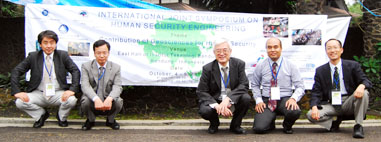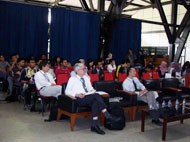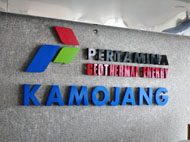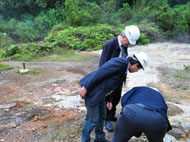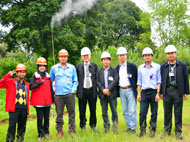Events
INTERNATIONAL JOINT SYMPOSIUM ON HUMAN SECURITY ENGINEERING - Contribution of Geosciences for Human Security -
Date: October 4 - 6, 2010
Venue: East Aula, Main Campus of Institut Teknologi (ITB), Bandung, Indonesia
Organized by:
- Indonesian Student Association of Kyoto
- Indonesian Student Association of Kansai
Co-organized by:
- Kyoto University Global COE "Human Security Engineering for Asian Megacities"
- Kyoto University Global COE "Energy Science in the Age of Global Warming"
- Center for Southeast Asian Studies Kyoto University
flyer
Guidelines for contributor of book chapter
Itinerary of Symposium for October 4th and 5th, 2010
Report 119
Outline
The purpose of this conference is to address and to disseminate recent research achievements that are delivered by researchers from Institut Teknologi Bandung, Kyoto University, and their research partners from both countries.
Report
The International Joint Symposium on Human Security Engineering: Contribution of Geosciences for Human Security was held at East Aula, ITB, on October 4 – 5, 2010. This symposium was organized by ITB, KU and KU Global COE on Human Security Engineering for Asian Megacities. This symposium became a special event, since the presenters originated not only from ITB and KU; but several researchers from oil and gas companies, geothermal companies, and consultants from Indonesia and Japan also participated in giving presentations related to Human Security Engineering issues. Altogether there were 19 presentations conducted during the 2 day symposium, which was attended by more than 150 participants. This symposium was opened by the Vice President of ITB for Research and Innovation (Dr. Wawan Gunawan A. Kadir) on behalf of ITB and Prof. Toshifumi Matsuoka on behalf of Kyoto University.
The Key objectives of this symposium were to produce a text book with a title the same as this symposium. Some presenters will be the main contributors to the book. The planned book will be divided into four sub-topics, namely:
1. Identification and solving problems related to urban areas.
2. Sustainable hydrocarbon production and CCS (Carbon Capture and Storage).
3. Geothermal as alternative renewable energy.
4. Urban disaster prevention and disaster management.
In addition, this symposium also discussed the renewable energy issue, such as geothermal energy. Indonesia has a huge potential in providing geothermal energy. The existing produced geothermal energy in Indonesia is only 1,200 MWe, or around 4.5% from the total geothermal energy potency of 27,000 MWe. Thus, the usage of geothermal energy in Indonesia is not yet optimal. The government of Indonesia is optimistic that 9,500 MWe could be produced from geothermal fields in Indonesia by 2025. On the other hand, the government of Indonesia introduced new policies related to energy security in Indonesia, two of them are reducing CO2 emission by 26% by 2020 and the use of new and renewable energy up to 25% by 2025. Those policies will direct Indonesian earth scientists to contribute in reaching this vision, and accelerate it through sustainable international cooperation. Since many Indonesian and Japanese researchers from different institutions have gathered in this symposium, new research cooperation that could be done together in the future was also discussed. Thus, new interactions between researchers and practitioners from both countries were developed during the conducted event.
On October 6th, 2010, the Japanese delegation had an opportunity to visit the Kamojang Geothermal Field, which is operated by Pertamina Geothermal Energy (PGE). This field has been running for more than 30 years without significant production decline, of which currently; this field could produce 200 MWe.

